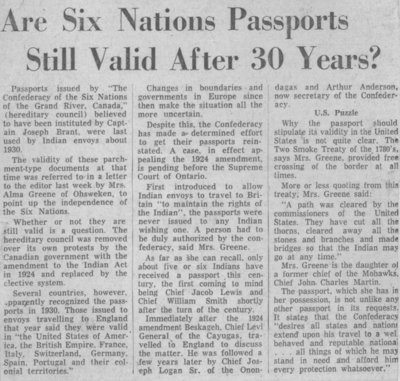Are Six Nations Passports Still Valid After 30 Years?
- Full Text
- Are Six Nations Passports Still Valid After 30 Years?
Passports issued by "The Confederacy of the Six Nations of the Grand River, Canada," (hereditary council) believed to have been instituted by Captain Joseph Brant, were last used by Indian envoys about 1930.
The validity of these parchment-type documents at that time was referred to in a letter to the editor last week by Mrs. Alma Green of Ohsweken, to point up the independence of the Six Nations.
Whether or not they are still valid is a question. The hereditary council was removed over its own protests by the Canadian government with the amendment to the Indian Act in 1924 and replaced by the elective system.
Several countries, however, apparently recognized the passports in 1930. Those issued to envoys travelling to England that year said they were valid in "the United States of America, the British Empire, France, Italy, Switzerland, Germany, Spain, Portugal and their colonial territories."
Changes in boundaries and governments in Europe since then make the situation all the more uncertain.
Despite this, the Confederacy has made a determined effort to get their passports reinstated. A case, in effect appealing the 1924 amendment, is pending before the Supreme Court of Ontario.
First introduced to allow Indian envoys to travel to Britain "to maintain the rights of the Indian", the passports were never issued to any Indian wishing one. A person had to be duly authorized by the confederacy, said Mrs. Greene.
As far as she can recall, only about five or six Indians have received a passport this century, the first coming to mind being Chief Jacobs Lewis and Chief William Smith shortly after the turn of the century.
Immediately after the 1924 amendment Beskageh, Chief Levi General of the Cayugas, travelled to England to discuss the matter. He was followed a few years later by Chief Joseph Logan Sr. of the Onondagas and Arthur Anderson, now secretary of the Confederacy.
U.S. PuzzleWhy the passport should stipulate its validity in the United States is not quite clear. The Two Smoke Treaty of the 1780's, says Mrs. Greene, provided free crossing of the border at all times.
More or less quoting from this treaty, Mrs. Greene said:
"A path was cleared by the commissioners of the United States. They have cut all the thorns, cleared away all the stones and branches and made bridges so that the Indian may go at any time."
Mrs. Greene is the daughter of a former chief of the Mohawks, Chief John Charles Martin.
The passport, which she has in her possession, is not unlike any other passport in its requests. It states that the Confederacy "desires all states and nations extend upon his travel to a well behaved and reputable national... all things of which he may stand in need and afford him every protection whatsoever."
- Media Type
- Newspaper
- Item Types
- Newspapers
- Clippings
- Description
- Article discussing the validity of Confederacy Passports with a contribution from Alma Greene.
- Date of Original
- c. 1950's
- Dimensions
-
Width: 1651 px
Height: 1574 px
- Subject(s)
- Personal Name(s)
- Anderson, Arthur ; Brant, Joseph ; Greene, Alma ; Logan, Joseph ; Lewis, Jacob ; Martin, John Charles ; Smith, William
- Local identifier
- SNPL000421v00i
- Language of Item
- English
- Geographic Coverage
-
-
Ontario, Canada
Latitude: 43.06681 Longitude: -80.11635
-
- Creative Commons licence
 [more details]
[more details]- Copyright Statement
- Protected by copyright: Uses are subject to the terms of a contract. Contact the repository for further information. Responsibility for any use rests exclusively with the user.
- Contact
- Six Nations Public LibraryEmail:info@snpl.ca
Website:
Agency street/mail address:1679 Chiefswood Rd
PO Box 149
Ohsweken, ON N0A 1M0
519-445-2954



